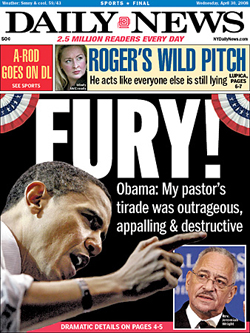Barack Obama is angry. He is outraged. He is appalled. He is offended. He is profoundly, genuinely sad and shaken. He is impassioned. He is pissed. And he is full of, as the New York Daily News puts it today: FURY!

Well: fury, meet sound. Because Obama’s anger—exhibited, kind of, yesterday at a press conference in which he yet again denounced the words of the Reverend Jeremiah Wright—has reverberated through the media ever since the words “outraged” and “angry” left the candidate’s lips yesterday afternoon. Today’s main media narrative, from the newspapers to the blogs, from the cable channels to the radio, makes banner-headline news of…an emotion.
– “Obama ‘outraged’ by Wright’s remarks” (CNN)
-“Democrat Obama “outraged” by former pastor” (Reuters)
-“Obama: ‘Saddened by the Spectacle’ (Wall Street Journal)
-“Obama “outraged” by Wright” (Salon)
-“Obama ‘angry’ at pastor comments” (BBC)
-“Obama ‘outraged’ by ex-pastor” (Al Jazeera English)
-“Obama says he’s outraged by former pastor’s comments” (AP)
-“Obama Expresses Outrage at Ex-Pastor’s Speech” (NPR)
-“Obama Says He’s Outraged by Ex-Pastor’s Comments (NYT’s The Caucus)
Et cetera.
The “big news! Obama’s angry!” headlines assume, somewhat oddly, that emotion itself is viable fodder for hard news. And, even more oddly, that assumption is perfectly appropriate. Obama had been resistant to personalizing the Wright narrative beyond what he revealed in his Philadelphia speech on race; indeed, there was an element of concession—along with an element of confession—in yesterday’s speech. Pundits, friend and foe alike, had been daring Obama to come forward and—even more strongly than he’d already done several times earlier—repudiate Wright’s controversial statements. And while Obama normally confronts a challenge by trying to simply transcend it, the camel’s-back-breaking straw of the Wright problem—the utter egregiousness and arrogance of the reverend’s speech at the National Press Club on Monday—presented a barrier too extensive to be vaulted over on the pole of words alone. Obama was forced, instead, to stay grounded—and, then, to plow right through the Wright wall. “This could not be handled by a speech about the complexities of modern life,” declares an editorial in today’s New York Times, referring to Wright’s “performances” over the weekend and on Monday. “It required a powerful, unambiguous denunciation—and Mr. Obama gave it.”
That denunciation makes Obama’s ire newsworthy: at this Crucial Moment #542 in the Democratic nominating contest, the candidate’s rejection of Wright—and, indeed, the emotion with which he did the rejecting—just may change the game.
Still, though, today’s prevailing Anger Narrative, justified though it may be, takes some gumption on the part of the press. At the very least, one hopes the “Obama’s angry” headlines were the result of deliberation, rather than simple reverberation. Particularly in light of the fact that all the outrage and the sadness and the sound and the fury—the Obamian Emotions that have been swelling headlines with their own dramatic solipsism—were things we took at his word. Literally. (What else could we do? You can’t fact-check emotion.) Obama’s declarations of outrage, strongly worded though they were, were uttered in his typical tones of laid-back self-possession. When the candidate discussed his personal relationship with Reverend Wright, to be sure, his sadness and disappointment about the apparent dissolution of that relationship were visible, nearly palpable. But when it came to the outrage he described…description was all we got.
The addition of the word “outrage” as a trope in Obama’s media narrative adds another layer of meaning, as well. As Eric Deggans, the St. Pete Times media critic, puts it in a Monday piece in the Huffington Post,
Those of us who write often about black folks and politics knew there would come a moment when the first black man with a realistic shot at becoming president would have to face this challenge—reconciling black anger and frustration with white fear and resentment.
There’s a tinge of inevitability to, as Deggans describes it, “the angry black man test”: Obama couldn’t go on transcending forever, and that’s as true of discussions of race as it is about any other aspect of his campaign. Deggans’s race-based notion of anger was echoed by Maureen Dowd in her Times column today, in which she parses the idea of “angry” blackness through the differences between Obama and Reverend Wright. “Barack Obama has spent his life, and campaign, trying not to be the Angry Black Man,” Dowd writes. But “on Tuesday, the Sort Of Angry Black Man appeared, reluctantly spurred into action by The Really Angry Black Man.”
We can’t know what Obama meant, exactly, when he described his own anger yesterday—but it’s worth noting the different conceptions of anger at play in all this: the communal version—based on culture and history—that Deggans and Dowd invoke is worlds away from the personal version most of today’s headlines suggest. There’s the anger that implies universality—we all know what it’s like to be pissed off—and the anger that suggestions complicated historical grievances and divisions. The levels of division inherent in anger make it even more important than usual that the media choose their words carefully.
Megan Garber is an assistant editor at the Nieman Journalism Lab at Harvard University. She was formerly a CJR staff writer.
